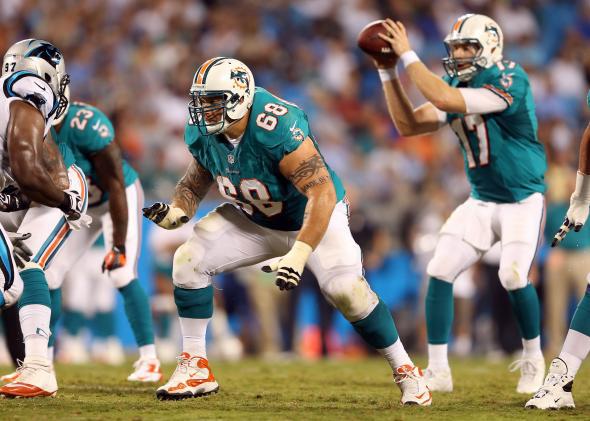Dave Zirin of The Nation digs into the long view issues raised by the nauseating Miami Dolphins bullying scandal. The NFL and society in general need to have a serious reconsideration of what we believe makes someone “a man,” Zirin argues. “The traditional ‘man code’ in the NFL is that your manhood is defined by your ability to inflict violence on others and deny the presence of pain—particularly mental or psychological pain—in yourself,” he writes, arguing that until we relax the destructive gender norms on men, bullying like this will continue.
Sadly, many people are already refusing to learn that lesson. As Slate’s Josh Levin noted, bullying victim Jonathan Martin is already getting abuse for reporting it, and sure enough, offensive lineman Tyson Clabo said that Martin failed to “stand up and be a man.” Presumably, being a man in this scenario would have meant using violence against bully Richie Incognito, which shows just what a precarious thing the concept of “manhood” continues to be. You can be a 300-pound NFL player, but the second you decide to act like an adult instead of punch someone in the face, apparently, your manhood gets taken away from you.
Zirin says it’s time to redefine “what we mean when we talk about ‘manhood’ and femininity.” He’s half right. What we really need to do is toss out those concepts altogether. As long as we imagine that there is “masculinity” and “femininity” and these things are in opposition, then men are going to be under relentless pressure at all points in time to prove that they’re not somehow turning into women.
Masculinity gets defined as “not women,” and so any trait that women might possess, no matter how positive, gets rejected. Women display compassion, so compassion is emasculating. Women are willing to admit they have hurt feelings or moments of pain, so men can’t even have that. Women are often expected to act like responsible adults, so hyper-masculine bullies like Incognito end up acting like immature children. Emily Bazelon and Josh Levin’s reporting shows how thorough the regression to childishness was in the Miami locker room, with players pulling junior high tactics like standing up when Martin tried to sit with them. We shouldn’t be surprised. Flip on any TV and witness the parade of responsible women cleaning things and having book clubs while their husbands demonstrate their non-femaleness by forgetting to pick up the kids at school.
In theory, the fact that women aren’t even allowed to play football should allow the men in the sport to relax and not feel constant pressure to prove they’re not-women. In practice, however, the all-male environments do the opposite, pushing men to be even more violent and immature to prove their masculinity. We’ll know the spell is broken when men learn to shrug it off when they’re accused of acting female-like, through nasty words like “pussy” or even just “little girl.” Until then, however, we can expect “manly” behavior like Incognito’s to continue.
